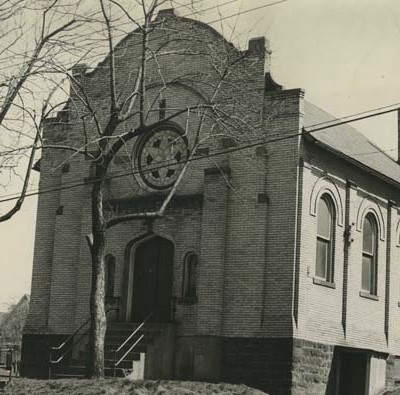
The borough of Ellwood City, Pa., was established along the border of Lawrence and Beaver counties about 1889. It quickly became both a popular resort destination and an important industrial center with the founding of several glass factories and a later a steel mill.
The first Jewish families to settle in Ellwood City arrived in the early 1890s and included Isadore and Esther Krause and the Keller family. In 1894, a group held High Holiday services in rented rooms at 702 Lawrence Avenue and started a cheder (religious school).
The first Jewish organization in Ellwood City was B’nai B’rith Lodge No. 638, which was established in 1908 with approximately twenty members. The small Jewish community in Ellwood City founded Congregation Tree of Life in 1909, fulfilling a dying wish from pioneering resident Pauline Keller. The Orthodox congregation acquired a lot at Wayne Avenue and 7th Street in 1910 and dedicated a $5,000 brick synagogue at in 1911. The congregation created a Hebrew Ladies Aid Society around the time of the dedication.
The Jewish community of Ellwood City became more established in the decade following the dedication. The American Jewish Yearbook listed a population of 39 in its 1919-1920 edition and 150 in its 1927-1928 edition. In 1922, Tree of Life burned its mortgage and prepared a formal constitution and bylaws. The following year, the congregation remodeled its Wayne Avenue synagogue. With the help of women in New Castle, the community converted the Hebrew Ladies Aid Society of Ellwood City into a National Council of Jewish Women section and started a Sunday school. In the 1920s, women from Ellwood City and nearby Wampum formed the Ellwood-Wampum Hadassah.
The American Jewish Yearbook listed a population of 180 for Ellwood City in its 1940-1941 edition. With the increased population came the need for larger and more modern facilities, and Tree of Life launched a building fund in 1945. The congregation broke ground on a new synagogue on Beatty Street near Ewing Park in 1952 and formally dedicated the building in 1954. The sanctuary took longer to finish and was dedicated separately in 1960. The building was often called the Ellwood City Jewish Community Center, reflecting a trend in the midcentury toward religious facilities with a social component.
The new synagogue and the reorganization of the community reflected not only the growth but also the diversity of the Jewish community, which had begun to attract members with a more liberal mindset. As part of the reorganization, the local National Council of Jewish Women and Hadassah chapters merged in 1951 to form the Jewish Women’s League. The league took an active role in fundraising activities for both the Jewish community and for civic organizations.
Although congregational records suggest that membership increased during the creation of the new synagogue, the American Jewish Yearbook listed a population of 147 in its 1951 edition and 110 in its 1984 edition. The overall population of Ellwood City started to decline after 1950 and accelerated with the closing of the U.S. Steel facility in the 1980s. Tree of Life closed in the mid-1990s, donating its Torah scroll to Riverview Towers in Pittsburgh and donating its Beatty Street synagogue to the local hospital. After the closing, many members joined congregations in Beaver Falls and New Castle.